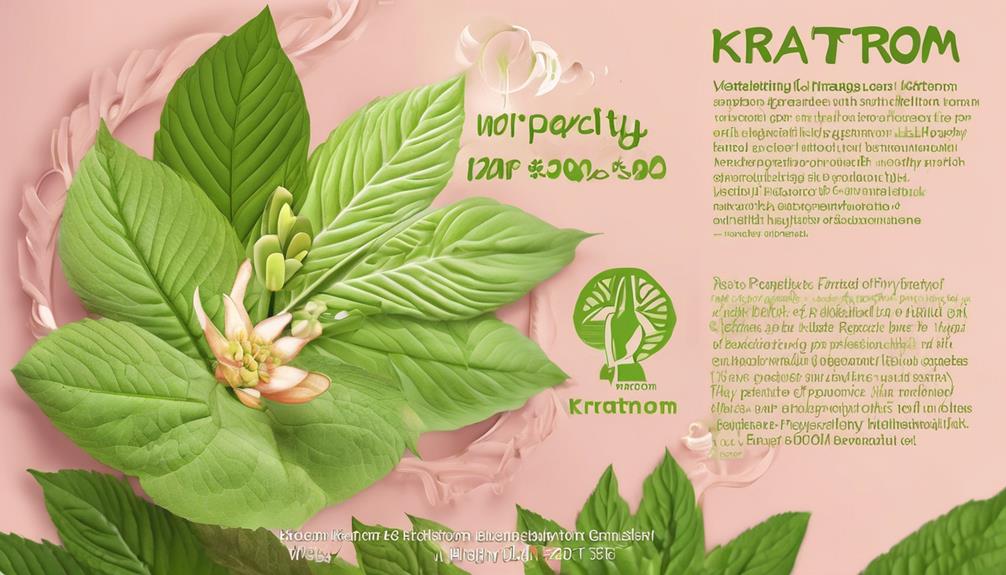If you've been curious about the potential impact of kratom on female fertility, there is much to explore. While the research in this area is limited, it's important to understand that kratom, with its known addictive properties, acts on the same receptors as opiates. This raises questions about its potential effects on hormonal balance, menstrual regularity, and overall reproductive health. In this discussion, we will delve into the potential risks and benefits of kratom use for women's fertility, shedding light on the concerns that surround its use and the need for further investigation.
Potential Impact on Menstrual Regularity

Regular use of kratom may potentially disrupt the regularity of your menstrual cycles due to its effects on hormone levels. The increased kratom exposure can lead to hormonal imbalances, which can affect the regularity of your menstrual cycles. The stimulant and sedative effects of kratom can disrupt your body's natural hormonal rhythm, potentially causing irregular periods. However, it is important to note that more research is needed to fully understand the specific ways in which kratom use can impact menstrual regularity.
It is crucial for women using kratom to be mindful of the potential impacts on their menstrual regularity. If you notice any changes or irregularities in your menstrual cycle, it is advisable to consult healthcare professionals for guidance and support. They can help assess the situation and provide appropriate recommendations based on your individual circumstances.
While the effects of kratom on menstrual regularity have been observed, it is important to remember that each person's experience may vary. Some women may notice significant disruptions, while others may not experience any changes at all. Nevertheless, it is essential to prioritize your health and well-being by staying informed and seeking professional advice when needed.
Effects on Ovulation and Hormonal Balance
Excessive doses of kratom can potentially disrupt ovulation and hormonal balance, impacting the delicate regulation of reproductive hormones. When it comes to kratom's effects on ovulation and hormonal balance, there are some important facts to consider:
- Interaction with hormonal receptors: Kratom contains alkaloids that interact with opioid receptors in the brain. These receptors are involved in the regulation of hormones related to ovulation and reproductive health. The impact of kratom on these receptors may disrupt the delicate balance of reproductive hormones in the body.
- Influence on ovulation: Research suggests that kratom's interaction with opioid receptors may affect the hormonal regulation involved in ovulation. This could potentially lead to irregular or absent ovulation, making it more difficult for women to conceive.
- Hormonal imbalances: Excessive doses of kratom have been linked to hormonal imbalances, which can have a negative impact on menstrual regularity and ovulation. Hormonal imbalances can cause irregular periods, missed periods, or changes in the length and intensity of menstrual cycles.
- Implications for fertility: Although limited research has been conducted on the specific effects of kratom on fertility, the potential disruption of ovulation and hormonal balance raises concerns for women of reproductive age who use kratom products. It is important for women who are trying to conceive or who are concerned about their fertility to be aware of these potential risks.
Kratom's Influence on Reproductive Health

When considering the impact of kratom on female fertility, it is important to understand how kratom can influence reproductive health. Kratom, scientifically known as Mitragyna speciosa, is a plant native to Southeast Asia that has gained popularity as a natural remedy for various conditions. However, its effects on reproductive health, particularly in women, are a cause for concern.
Exposure to kratom during pregnancy can have detrimental effects on both the mother and the developing fetus. Studies have shown that kratom can cross the placenta, potentially leading to premature birth and negative impacts on fetal growth and development. Additionally, exposure to kratom during pregnancy can result in withdrawal symptoms in newborns, requiring treatment and potentially hindering mother-infant bonding.
Regular use of kratom can also lead to drug dependency, which can affect the mother's overall health and potentially impact the well-being of the baby. It is crucial for pregnant women to seek immediate medical guidance if considering quitting kratom use to avoid potential risks to their own health and the health of the baby.
Given the potential risks associated with kratom use during pregnancy, it is important for women to approach its use with caution. Government oversight and regulation are necessary to ensure the safety and well-being of both women and their unborn babies. Further research is needed to fully understand the extent of kratom's influence on reproductive health in women.
Fertility Concerns and Kratom Use
Using kratom may have implications for female fertility and reproductive health, as research on its effects in this area is limited. While the exact impact of kratom on female fertility is still unclear, there are fertility concerns that women should be aware of if they are considering using kratom. Here are four important points to keep in mind:
- Neonatal abstinence syndrome: Kratom use during pregnancy has been associated with neonatal abstinence syndrome (NAS), a condition where newborns experience withdrawal symptoms due to exposure to substances in the womb. This suggests that kratom use during pregnancy may have negative effects on the developing fetus and potentially impact fertility.
- Limited research on female fertility: There is a lack of scientific studies specifically examining the effects of kratom on female fertility. Therefore, it is essential for women who are trying to conceive or are concerned about their fertility to consult with a healthcare provider to understand the potential risks associated with kratom use.
- Hormone levels and fertility: Some limited research suggests that kratom may affect hormone levels related to fertility. Hormones play a crucial role in regulating the menstrual cycle and overall reproductive health. Any disruptions to hormone levels can potentially impact fertility and reproductive function.
- Opioid receptors and fertility: Kratom contains alkaloids that interact with opioid receptors in the body. Opioid receptors are involved in various physiological processes, including fertility. The potential impact of kratom's interaction with these receptors on female fertility needs further investigation.
Understanding the Risks and Benefits of Kratom for Women's Fertility

Understanding the potential risks and benefits of kratom for women's fertility is crucial for making informed decisions about its use. Kratom, a substance that can act as an opioid due to its compounds binding to opioid receptors, poses risks for female fertility. For women who are pregnant, using kratom may increase the risk of neonatal abstinence syndrome in their babies. This syndrome leads to withdrawal symptoms in newborns after birth, which can have negative effects on their health and development. Additionally, exposure to kratom during pregnancy can result in premature birth and hinder the growth and well-being of the baby.
Discontinuing kratom use is crucial for the well-being of both the mother and child. It is important to seek a safe way to quit and reduce any potential harm to fertility and pregnancy outcomes. The risks associated with kratom use during pregnancy highlight the need for caution and informed decision-making.
On the other hand, it is also important to consider the potential benefits of kratom for women's fertility. However, research in this area is limited, and the risks currently outweigh any potential benefits. It is essential to prioritize the health and well-being of both the woman and her future baby.
Can Red Elephant Kratom Affect Female Fertility?
Red elephant kratom overview suggests that it may impact female fertility. Limited research exists on its effects, but some believe that prolonged use can disrupt hormonal balance and potentially interfere with reproductive health. It is important for women trying to conceive to consult with a healthcare professional before using red elephant kratom.
Frequently Asked Questions
Does Kratom Effect Prolactin?
Does kratom affect prolactin? It's unclear whether kratom has a direct impact on prolactin levels. However, if you're concerned about kratom's potential effects on your menstrual cycles, hormonal imbalance, reproductive health, or fertility treatments, it's essential to consult with a healthcare professional. They can provide personalized advice based on your unique circumstances and help you make informed decisions about kratom use and its potential impact on prolactin and fertility.
Does Kratom Increase Dopamine?
Yes, kratom does increase dopamine levels in the brain. This can have an impact on your mental health, as it contributes to feelings of pleasure, motivation, and euphoria. However, it's important to be aware of kratom's potential for addiction, as its effect on dopamine may make it more addictive. While kratom may have positive effects on sexual desire and managing chronic pain, it's crucial to understand the risks and potential consequences of its use.
Can Kratom Cause Cardiotoxicity?
Using kratom may increase your risk of experiencing cardiotoxicity, which can negatively impact your heart health. It's important to understand the potential effects of kratom on your hormonal balance and reproductive health, especially if you're a female. Research is needed to investigate the relationship between kratom use and heart health, as well as its impact on female fertility. Considering these risks, it's crucial to use caution and consult with a healthcare professional before using kratom, especially if you have pre-existing heart conditions.
Is Kratom Use Among Pregnant and Lactating Individuals With Substance Use Disorder?
Using kratom during pregnancy and while breastfeeding can have serious consequences for newborns and child development. It's important to understand the potential risks and seek safe alternatives. Babies exposed to maternal kratom use may experience withdrawal symptoms and require specialized care. Additionally, the long-term effects on child development are still unknown. Breastfeeding while using kratom can also pose risks to the baby. It's crucial to prioritize the health and well-being of both mother and child by avoiding kratom use during this time.










